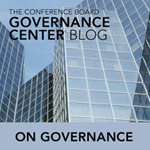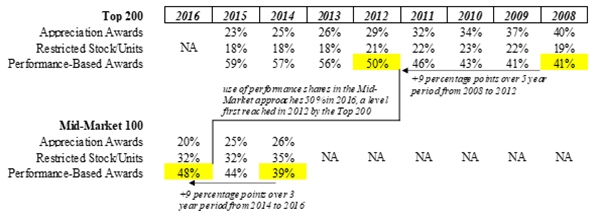On Governance: Stock Buybacks – A Recent Trend That
May Change Executive Compensation Pay Practices
|
|
On Governance is a series of guest blog posts from corporate
governance thought leaders. The series, which is curated by the
Governance Center research team, is meant to serve as a way to
spark discussion on some of the most important corporate
governance issues. |
|
|
On June 11, 2018, SEC Commissioner Robert Jackson highlighted the practice
of executives more likely to sell stock following a stock buyback.
Commissioner Jackson’ analysis shows that “twice as many companies have
insiders selling in the eight days after a buyback announcement as sell on
an ordinary day.” The implication is that executives take advantage of the
stock price bump-up to sell shares. His remedy is two-fold: (1) SEC will
review the safe harbor rules for insiders selling shares and (2) implore
boards and compensation committees to review this practice.
A stock buyback is when a company purchases its own stock, either on the
open market or directly from its shareholders. A buyback is also known as
a share buyback or stock repurchase. Similar to a dividend, a buyback is a
way to return capital to shareholders. While a dividend is effectively a
cash bonus amounting to a percentage of a shareholder's total stock value,
a stock buyback requires the shareholder to surrender stock to the company
to receive cash. Those shares are then pulled out of circulation and taken
off the market, thus having a similar effect of returning capital to
shareholders.
Buybacks are a relatively new concept. Prior to 1982, they were not
common. In fact, they were illegal throughout most of the 20th century
because Buybacks were considered a form of stock market manipulation. In
1982, the SEC passed Rule 10b-18, which created a legal process for
executing a buyback.
Today, in 2018, more companies than ever are buying back stock. The
increase in buybacks has been fueled by The Tax Cuts and Jobs Act passed
on December 27, 2017, which substantially lowered the corporate income tax
rate as well as repatriation tax that encouraged money held abroad to be
brought back to the United States.
There are three main types of buybacks: cash-based, loan-based and a
combination of cash and equity. The effect of a buyback on an executive
incentive program and pay levels will depend on a variety of factors and
is specific to each company and its unique incentive program. In general,
there are many positive aspects of buybacks, which center on increasing
stock price and thus shareholder value:
1.
Increase Shareholder Value:
Often, a company will use a buyback to pump up the price of its shares
when it believes they have become undervalued. The undervalued stock is
brought back at a lower price and is sometimes viewed as a signal by
investors that the stock will appreciate in value (even greater than the
percent brought back).
2.
Return Cash to Shareholders:
Buybacks are often used to provide current shareholders with a cash
distribution, and this is viewed as a bonus by many investors. Thus, an
investor can sell some of the stock held back either to the company or
into the open market, which is supported by the strong demand created by
the buyback.
3.
Provide Consistent Shareholder Returns:
Buybacks provide more consistent returns to shareholders vs. special cash
or stock dividends that only benefit the current shareholders. This allows
buybacks to complement dividend rates, boosting shareholder return without
having to increase a stable dividend rate.
4.
Reduce Aggregate Cash Dividends:
Buybacks provide a viable way for companies to reduce their cash outflow,
without actually having to cut their dividends. Fewer outstanding shares
mean fewer dividends to be paid, and a company may reduce their dividends
by a significant amount. The present value of the reduction in aggregate
cash dividends may be less than the cost of the buyback.
5.
Increase Earnings per Share (EPS):
Removing some shares from the marketplace means annual earnings will be
distributed among fewer shares, and each share will be entitled to a
greater portion of earnings. The reduction of shares is somewhat
counteracted by the interest earned on the cash used for the buyback.
6.
Boost Capital Efficiency Measures:
Buybacks can increase financial ratios used to calculate capital
efficiency measures such as Return on Equity (ROE), Return on Assets (ROA),
or Return on Invested Capital (ROIC). Capital structure plays a large role
in how companies optimize opportunities and provide cash for growth and
operations. A major factor of capital structure is the debt to equity
ratio. When a company initiates a buyback, it effectively changes its
capital structure, because fewer outstanding shares equates to less
outstanding equity. This change in structure has the benefit of increasing
a company’s capital efficiency measures, simply because its generated
returns are now linked to a lower level of equity, assets, and invested
capital.
7.
Increase Market Liquidity:
Sometimes a large shareholder or seller of a specific stock is looking to
liquefy their holdings, and the stock-issuing company may offer to buy
back their shares from them.
8.
Offset Dilution.
A buyback will offset dilution from issuance of shares as part of a
long-term incentive (LTI) program.
Despite these positive attributes, there has been much criticism
surrounding buybacks, particularly surrounding their potential to increase
executive compensation levels regardless of the operational success of the
company. This is particularly true with the recent reduction in corporate
income tax rates. The underlying business model has not really changed or
improved, but there is extra cash generated due to the tax savings.
Buybacks directly influence many of the financial ratios used as
performance metrics in executive LTI plans. As discussed previously,
Buybacks can boost EPS, ROE, ROA, ROIC, or stock price. While growth in
pay levels through the increased value of stock holdings and LTI payouts
may benefit executives, there is bound to be criticism from investors,
employees, and political factions.
A key connection between buybacks and executive pay is EPS. A buyback will
reduce the number of a company’s outstanding shares and thereby increase
the earnings per share metric. EPS is often a key benchmark for an
executive’s performance-based pay – particularly in LTI programs. In
addition to EPS, a buyback also impacts other parts of the financial
statement. On the balance sheet, a share repurchase will reduce the
company’s cash holdings, and consequently its total assets base, by the
amount of the cash expended in the buyback. The buyback will
simultaneously also shrink shareholders' equity on the liabilities side by
the same amount. As a result, performance metrics such as ROE ROA and ROIC
typically improves following a buyback. Like EPS, each of these capital
efficiency measures are commonly used in executive LTI plans.
Another issue when it comes to executive compensation is that a buyback
generally occurs during an LTI award’s performance period, and there is no
corresponding adjustment to the performance goals to offset the effect of
the Buyback. So, it can be said that a Buyback gives the executives a head
start in achieving their performance goals.
At a time when institutional investors frequently challenge whether
performance targets are rigorous enough, critics of buybacks believe
senior executives should not receive larger pay packages simply for
reducing the number of shares outstanding. There is also concern that
while buybacks they may boost stock prices in the short term, they can
deprive companies of capital necessary for creating long-term growth.
A Closer Look at Buybacks and Executive Pay
It is indeed true that executives in the United States will receive larger
incentive payouts when measures like EPS, ROE, ROA, ROIC, and stock price
show improvement (financially engineered or not).
Today’s executive pay packages 1) include a significant portion of LTI
awards, and 2) rely heavily on LTI awards with performance conditions
(versus time-based awards). A recent Gallagher study[1]
showed that a majority of executive LTI awards at large-cap companies are
tied to performance measures, including stock-price- or EPS-related
measures. Among the Top-200 companies by market capitalization,
performance-based LTI awards first averaged 50 percent of the total LTI
grant value back in 2012. By 2015, performance-based awards had increased
to 59 percent of the total LTI grant value.
Following closely behind top companies, we found that midmarket companies
have also moved towards LTI programs focused on performance-based awards[2].
In 2016, performance-based awards made up 48 percent of the total LTI
grant value among these companies, up from just 39 percent in 2014. This
midmarket sample includes 100 companies selected at random from the
Russell 3000 universe and included companies across multiple industry
sectors with revenues between $1 billion and $5 billion (nonfinancial
companies) or assets between $1 billion and $10 billion (financial
companies). See Figure 2.
FIGURE 2. Mid-Market Companies Follow the Large Company Trend of Relying
on Performance-Based LTI Awards
Conclusion
Boards of directors continually search for ways to increase shareholder
value. This process will sometimes result in a decision to buy back
company stock. Care should be taken to avoid enrichment of executive pay
packages as a result of the buyback. The selection of performance measures
and corresponding performance levels can be one of the most difficult
aspects of designing an incentive compensation program for executives.
Scrutiny may be further complicated as buybacks continue to increase in
prevalence. Companies should be cautious when selecting performance
measures that can be manipulated by financial engineering such as
buybacks, equity to debt swaps and other re-financings, and be ready to
explain the reasoning behind such choices in the annual proxy statement.
The views presented on the Governance Center Blog are not the official
views of The Conference Board or the Governance Center and are not
necessarily endorsed by all members, sponsors, advisors, contributors,
staff members, or others associated with The Conference Board or the
Governance Center.
The
views presented on the Governance Center Blog are not the official views
of The Conference Board or the Governance Center and are not necessarily
endorsed by all members, sponsors, advisors, contributors, staff members,
or others associated with The Conference Board or the Governance Center.
[1]
Gallagher’s 2015 Study of Short- and Long-Term Incentive Design Criteria
Among Top 200 Companies (https://papers.ssrn.com/sol3/papers.cfm?abstract_id=2916206)
[2]
Current Trends in 'Mid-Market' Incentive Plan Design (https://papers.ssrn.com/sol3/papers.cfm?abstract_id=3152287)
|
About the Author: James F.
Reda
Managing Director,
Executive Compensation
Arthur J. Gallagher & Co Human Resources & Compensation Consulting
Practice
|
 |
Jim works with both public and private organizations in planning,
creating, and implementing incentive programs. Jim also advises
companies on incentive strategy, including long- and short-term
senior executive employment arrangements, change-in-control
metrics, business combinations, shareholder rights, and corporate
governance issues. He is a recognized expert in the area of
integrating incentive and corporate strategies.
Jim has more than 27 years of experience specifically in the area
of senior executive compensation. Prior to forming his own firm in
2004 (which was acquired by Arthur J. Gallagher & Co. in 2011),
Jim worked at three major executive compensation consulting firms.
He began his executive compensation consulting career at The
Bachelder Group in 1987, where he worked for nine years.
More from James F. Reda
|
|
| ©
2018 The Conference Board Inc. |
|



